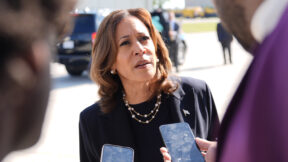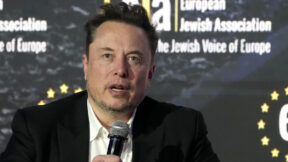NYT Op-Ed Covers Explosive Study Finding Mask Mandates Useless: ‘Will Any Lessons Be Learned?’

Sipa via AP Images
In an op-ed this week from columnist Bret Stephens, the New York Times had its first coverage of an explosive new Cochrane review of medical studies that concludes there is no evidence mask mandates did anything beneficial at all during the Covid pandemic, anywhere in the world, under any conditions whatsoever. The question in the article’s headline: “Will any lessons be learned?”
Masking was a key component of the government’s response to Covid under both Presidents Donald Trump and Joe Biden, and the mandates remain a major point of political contention.
To briefly summarize, the Cochrane study conducted by Oxford University epidemiologist Tom Jefferson and colleagues, is a meta-analysis covering dozens of studies covering several years of data on masking, and concluded that, as Jefferson put it in an interview with Maryanne Demasi, “there is just no evidence that they make any difference. Full stop.”
In his NYT editorial, Stephens summarizes Jefferson’s conclusions:
The most rigorous and comprehensive analysis of scientific studies conducted on the efficacy of masks for reducing the spread of respiratory illnesses — including Covid-19 — was published late last month. Its conclusions, said Tom Jefferson, the Oxford epidemiologist who is its lead author, were unambiguous.
“There is just no evidence that they” — masks — “make any difference,” he told the journalist Maryanne Demasi. “Full stop.”
But, wait, hold on. What about N-95 masks, as opposed to lower-quality surgical or cloth masks?
“Makes no difference — none of it,” said Jefferson.
What about the studies that initially persuaded policymakers to impose mask mandates?
“They were convinced by nonrandomized studies, flawed observational studies.”
What about the utility of masks in conjunction with other preventive measures, such as hand hygiene, physical distancing or air filtration?
“There’s no evidence that many of these things make any difference.”
The essential point, encapsulated in the Times headline’s question, is about the blasting and shunning of mask critics in the press and at large.
“[W]hen it comes to the population-level benefits of masking, the verdict is in: Mask mandates were a bust,” writes Stephens.
He calls out the labeling of views as disinformation specifically, including evoking if not referencing Twitter Files revelations about bans, shadowbans, and censorship by Big Tech with the help of media. And Stephens puts forward the rationale for mea culpas.
“Those skeptics who were furiously mocked as cranks and occasionally censored as ‘misinformers’ for opposing mandates were right. The mainstream experts and pundits who supported mandates were wrong,” he writes. “In a better world, it would behoove the latter group to acknowledge their error, along with its considerable physical, psychological, pedagogical and political costs.”
“Don’t count on it,” he says, however.
Stephens goes on to outline a mindset he says was at work in the “mindless adherence” to a policy that wasn’t effective and the enforcing of that view by institutions and social authorities and elites, which mindset he argues is also why there won’t be an concession or correction after the fact, much less any resignations by public officials.
On the findings, Stephens concludes, “the Cochrane report ought to be the final nail in this particular coffin.”
The editorial was met primarily with three types of responses online: the too little too late recriminations toward the Times and media, the “I told you so” of those who opposed the mandates, and the predictable labeling of the objection to slapping the disinformation label on science as itself dangerous disinformation. There were also a number of objections to the study being relegated to an opinion piece rather than the Health section of the paper.
The Cochrane study, though comprehensive science from one of the most respected institutions to conduct such research, still managed to create a great deal of back-and-forth debate on Twitter, in other words. Which situation many have argued for several years is the appropriate way for public debate to work, and precisely how it did not during the pandemic.
Which was really the most central point of the article.
The next topic one might expect is studies on harmful outcomes of mask mandates and lockdowns. And the headline question at that time might be about whether or how the Times or other mainstream outlets cover that.
Have a tip for us? tips@mediaite.com






